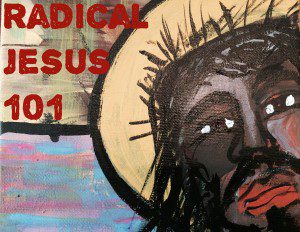
First of all, I’m completely dissatisfied with the title. Few words are more played out in the Christian blogosphere than “radical.” And yet I can’t think of another succinct way to capture the theological/political space I inhabit than to say that I worship a “radical” Jesus. For most of my adult life, I’ve lived in the strange intersection of what might seem like starkly contradictory orthodoxies: the evangelical Christianity I grew up with and the radical political ethos I have gained from my decades of involvement with what we used to just call “the movement,” which has spawned various incarnations over the years such as Occupy Wall Street and Black Lives Matter. For years, I’ve been trying to pin down how I have come to understand the basic concepts of Christianity after living among radicals whose lives seemed to reflect the spirit of Jesus’ movement even though they often didn’t self-identify as Christian.
In my first year of campus ministry, I have spent a lot of time with students who share my radical political perspective but not my religious beliefs. Some of them grew up in the church as I did and were turned away for very legitimate reasons. They have shared that they hunger for spiritual groundedness and are trying to figure out what theological resources they can salvage from their Christian upbringing. This blog series is intended primarily to be a resource for these friends who are in exile from a church that has failed them. My goal is to show in a straightforward and accessible way how Jesus’ teachings can actually be a source of genuine liberation despite the way that they’ve been appropriated by the forces of empire, white supremacy, and hetero-patriarchy over the past several centuries.
I honestly believe that Christianity needs to be reinterpreted through the lens of radical political critique in order to be delivered from its captivity to empire. The theology that many of my fellow evangelical Christians today consider “orthodox” has been inherited uncritically from our western European ancestors who were not prevented by this theology (with a few exceptions) from supporting and participating in the sins of slavery and colonialism. It seems irresponsible not to try to account for what went so horribly wrong in our ancestors’ thinking that made blatantly inhumane and un-Christ-like behavior seem perfectly acceptable to them. It’s hard not to suspect that certain core aspects of our theology have been distorted by our ancestors’ needs to justify the massacre and ownership of other human beings.
For example, making morality into a question of obeying God’s rules rather than treating other people with dignity seems like a good ideological tactic for turning the exploitation and domination of other nations into a “reluctant” duty performed in “obedience” to God, or as Rudyard Kipling put it, the “white man’s burden.” Taking a radically nihilistic perspective on the innate wickedness of human nature outside of Christianity seems like a perfect way to justify colonial conquest. A Christianity that only concerns itself with whether I go to heaven or hell if I die today seems like the kind of Christianity that would naturally form in opposition to the social gospel Christianity that was instrumental to abolitionism and the women’s suffrage movement. Suspicions like these are what compel me to reexamine some of the essential core teachings of Christianity with a sympathy for the radical critiques that have been made against it.
Incidentally, I don’t think that what I’m calling a “radical” political ethos is really all that radical. Being a “radical” just means believing that peoples’ lives are more important than the mathematical elegance of a pristine, deregulated market; that bombs do not make democracy flourish; that pollution really can make our world uninhabitable; that no one should be damned for being born with a different sexuality; that it’s not okay for people of color to suffer systemic oppression even if most white people aren’t actively trying to be hurtful; that people at every point on the fluid spectrum from male to female have beautiful gifts to offer humanity that should not be suppressed by concerns about maintaining gender norms.
Basically, being a “radical” means refusing to settle for anything less than a world which has enough room for everyone to contribute and to belong, according to the beauty with which God has created them. That’s how I understand both the goal of radical politics and the meaning of Biblical justice, and I interpret all Christian teaching as a means to this ultimate goal. So this blog series Radical Jesus 101 will offer an understanding of basic Christian theological concepts which presumes that God is not an angry, arbitrary, punitive tyrant but a loving, just, and pragmatic nurturer who actually wants to shape humanity into the perfect society that so many radicals dream of building without knowing how in the world to get there. I believe that Jesus has amazing resources to offer radicals who are fighting for a better world, whether they’re Christian or not. I hope you will join me on this journey over the coming weeks.












